Quartet is an entertaining light comedy, and a solid directorial début from Dustin Hoffman. The film itself isn’t too surprising or demanding, but – as The Best Exotic Marigold Hotel demonstrated earlier in the year – there is something to be said for putting a bunch of older actors together in a room and letting them remind you what they can do. Quartet is a fairly standard “life doesn’t end at retirment” film, and one that makes smart use of a talented ensemble cast. Indeed, as the credits roll, we’re reminded of just how talented as Hoffman introduces us to each of the performers – many of whom have long and impressive careers in theatre or music.
There’s nothing here that will surprise anybody, but it is occasionally nice to be reminded just how superb some of the older generation of actors can be.
To suggest Quartet lacks any real sense of narrative tension is to miss the point. Sure, the plot is driven by a fundraiser to secure the future of Beecham House, a retirement home for ageing musical stars, but it’s really just a convenient plot device. After all, by the time we reach curtain call on the first night, that fundraiser has succeeded or failed. As soon as you sell the last ticket, the finances of retirement community is secure, and the actual performance is something of an after-thought.
One gets the sense, however, that that is the point of this whole exorcise. There’s really no suspense because we really shouldn’t be surprised by the revelation that a person can still be useful past retirement age. The film commendably avoids sensationalising the problems facing our lead characters, treating them as concerns that can be carefully managed rather than problems that rob them of their dignity. There’s never any real doubt that our four singers are more than capable of delivering a performance to remember, and I respect Quartet for not trying to generate false drama.
At the same time, though, it does mean that there’s never any real doubt or suspense. That’s not inherently a problem, but it does become a bit of an issue when the movie spends a great deal of time trying to convince us that the annual concert is such a big deal. We hear about how Beecham House is in trouble, and about how the concert absolutely must go right, and about how they really need that one act in order to tie it all together. The problem is that once you can put that one act on a poster, those financial concerns evaporated about mid-way through the second act.
Of course, it has to be a big deal in order to reunite the eponymous quartet. However, once all four agree to appear on stage, any pretence of suspense is gone. The “happily ever after” for Beecham House itself is secure, which means that there’s really not too much riding on the performance itself. Of course, there is quite a lot of personal stuff hanging on the reunion for each of the four musicians taking to the stage, but the early focus on the fundraiser and constant reminders of the perilous and unguaranteed year-to-year existence of the retirement home seem to distract a bit from that.
As does, for example, the fact that Hoffman’s four leading performers are not opera singers. Naturally, finding four opera singers who could act anywhere near as well as Maggie Smith, Tom Courtney, Billy Connolly or Pauline Collins would be no small miracle – I can understand who Hoffman chose to cast actors rather than singers. Still, it presents a bit of a problem when the film has to have the four performers unite on-stage.
Given it’s unlikely that a Smith-Courtney-Connolly-Collins version of the piece would be as technically impressive as the situation demands, Hoffman is left with a limited number of options about how to execute the big moment. He opts for the most logical and reasonable, but it still feels just a little bit of an anti-climax. We’ve been watching these four singers come to terms with their new existence, and trying to realise that they still have gifts they can share and contribute, so it creates a situation where it is very difficult for the film to really follow through on that.
Still, if you can get past these problems, Quartet serves as a wonderful showcase for four very talented performers. Maggie Smith is a British national treasure, and an absolute joy to watch in pretty much anything. Casting her as the prima donna Jean, the script provides Smith with enough bile and sarcasm to keep the film moving smoothly. Smith has turned the put-down into something just shy of an artform, and she has that rare ability to project both dignity and vulnerability. Quartet is very much Smith’s film and it succeeds by that measure.
Smith is, of course, more than ably assisted by a wonderful ensemble. Tom Courtney is fantastic as the restrained and sincere Reggie, playing a relatively quiet and subdued role with a wonderful comic timing. There’s something very human in Courtney’s performance, as he manages to convey a character losing his footing in the world and trying not to let anybody know just how insecure he feels about it.
Watching Courtney discuss the similarities between opera and rap music is a wonderful little scene, and his chemistry with Smith is fantastic. You almost immediately get a sense of exactly what happened between Jean and Reggie thanks to the performers, before the script has a chance to elaborate. Connolly has always been a fine and charming actor, even if his choice of projects hasn’t been the most discriminating. The film makes great use of him. And Collins is superb as ever.
The cast is rounded out by supporting turns from Michael Gambon and Andrew Sachs. Gambon is particular fun as he chews the scenery with abandon, bullying and manipulating those around him while trying to pull off the most ridiculous of gowns. Hoffman really has pulled together an impressive and talented ensemble, and he cleverly decides to allow each member of the cast a bit of room to breathe. His style is unobtrusive and dignified. It’s not showy, but it is clear and careful. In particular, I quite like the opening sequence which is scored consistently, but with the instrumentation changing with each cut.
Perhaps the most endearing aspect of Quartet is the way that it treats its leads with dignity and respect. The four performers are more than a collection of afflictions and sob stories. We know that at least two of the four have serious health complaints, but they aren’t defined by those problems. Earning the respect and consideration of the people around them is never an issue, and we’re never asked to pity them too much – only Jean and Reggie’s occasionally self-pity is seen to truly diminish them as people, and the plot is glad to see both overcome that self-imposed handicap.
Quartet doesn’t re-write the rulebook when it comes to movies about retirement or how we treat the elderly, but it doesn’t really try. It’s a pleasant film with four fantastic lead performances. Given it’s a story about celebrating the talents of an older generation, it feels strangely appropriate that the aspect of the film that best recommends itself is the opportunity to see four great actors working in tandem.
Filed under: Non-Review Reviews | Tagged: arts, Best Exotic Marigold Hotel, Billy Connolly, dustinhoffman, film, Hoffman, Maggie Smith, michael gambon, Movie, non-review review, Pauline Collins, Quartet, r eview, review, Tom Courtenay, Tom Courtney |















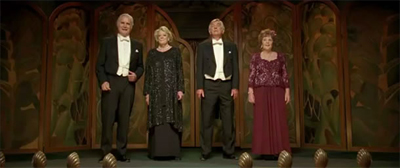
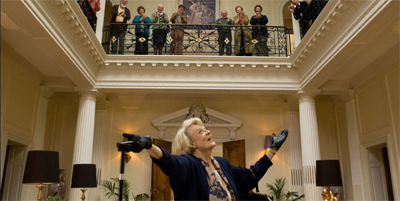
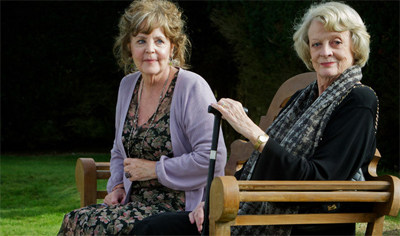
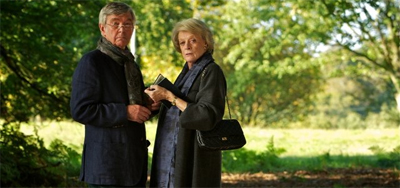
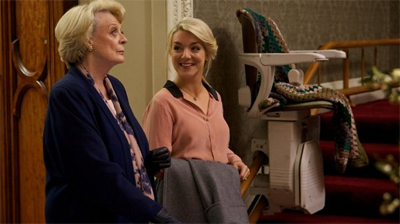
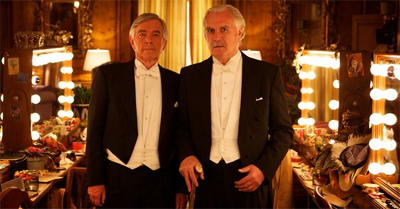





Leave a comment